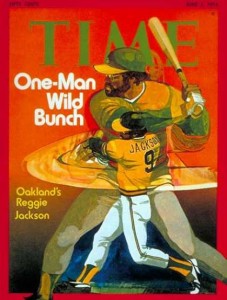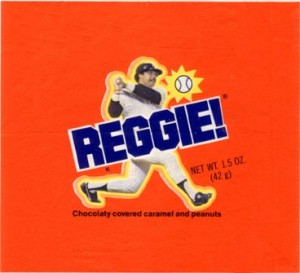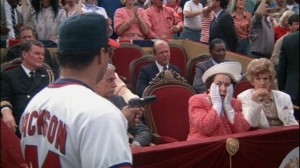The No. 8 Most Quotable Figure in Baseball History
June 14, 2011 by David Nathan · 1 Comment
There are few nicknames in all of sports better than Mr. October. The very nature of the moniker keeps Reginald Martinez Jackson in the conversation of the best Big Game performers, and his status in the lexicon of Great Yankees is assured.
Coming out of Arizona State, Reggie was drafted 2nd overall by the Kansas City Athletics in the 1966 draft. The Mets passed on him for the immortal Steve Chilcott (he and Brien Taylor are the only top draft picks to never play in the majors). It didn’t take long for Jackson to make it to the majors, playing for KC in their last season before Charlie Finley moved the team to Oakland. In 1969, he hit 47 homers and made the first of 14 All-Star teams. A prodigious power hitter, Reggie also struck out at a startling rate–he led the AL in his first four full seasons and finished his career with 2,597, which is still the all-time mark, with Jim Thome still almost 200 behind. But Reggie understood early on, “taters, that’s where the money is.” And besides, whenever he struck out he would remember that “a billion people in China don’t care.”
The early 70’s A’s were a dynasty, and Reggie was their biggest star. He added to his legend when he hit the light tower on the roof of Tiger Stadium in the 1971 All-Star Game. The A’s lost the ALCS that season, but won the World Series the next three years –although Reggie couldn’t play in the 1972 Series due to injury. He won the 1973 MVP (Regular season and World Series). The A’s run ended with an ALCS loss in 1975, and afterward Finley started dismantling the club with a series of trades and the staunch refusal to pay to keep his stars. With free agency on the horizon, the A’s traded Reggie to Baltimore in a 6-player swap for the 1976 season.
The Oakland years were not without controversy–Reggie’s ego was a constant source of contention. He famously said, “love me or hate me, you can’t ignore me.” He once noted of Cleveland, “there aren’t enough papers here to carry my quotes.” And when the prospect of playing in New York was mentioned, he displayed clairvoyance: “If I played there they’d name a candy bar after me.”
You could win a lot of bar bets if you asked someone to name the four teams that Reggie played for in his 21-year career. His time in Baltimore was brief, and although he did lead the league in slugging, his overall production was down and the team finished in second to the Yankees, who were swept by the Reds.
Reggie spent only five seasons with the Yankees, but they were the peak of the Bronx Zoo era. Thurman Munson was the Captain. Willie Randolph, Bucky Dent, and Chris Chambliss manned the infield. Graig Nettles, Lou Piniella, and Mickey Rivers would be Hall of Famers on their quotes alone. And the pitching staff included Ron Guidry, Catfish Hunter and Goose Gossage. In short, they were loaded, but New York had not won the World Series since 1962, and owner George Steinbrenner was growing impatient. Add firebrand manager Billy Martin to the mix and you had the stuff of Greek drama. Of his star player and owner, Martin later noted, “They’re made for each other. One’s a born liar, the other’s convicted.” His teammates had a more positive view of Reggie: “He’d give you the shirt off his back. Of course, he’d call a press conference to announce it,” said Catfish Hunter.
The Yankees signed Reggie to a five-year contract for just under $3 million (that’s total–not per year). Before he had even played a game, he was quoted as saying, “This team, it all flows from me. I’m the straw that stirs the drink.” The Yankees fought in the clubhouse and in the dugout, but they won the AL and went into the 1977 World Series with the Dodgers. Before the Series, Munson gave Reggie the Mr. October tag, and it stuck. Hitting three home runs off three different pitchers in the clinching Game 6 didn’t hurt either.
If Reggie’s ego was over-inflated before the 1977 World Series, it only got worse (or better, depending on your appreciation of his skills). “Sometimes I underestimate the magnitude of me,” he once claimed. Reggie also remarked that the worst part about playing in the World Series was that he couldn’t watch himself play. “I represent both the underdogs and overdog in our society,” Reggie said. In 1978, it took a complete collapse by the Red Sox to allow New York the chance to repeat. After being 14 games back on July 18, the teams finished in a tie, which Bucky Dent famously untied. Another victory over LA in the WS helped increase sales of the Reggie! Bar
Managers and players came and went. The relationship between Jackson and Steinbrenner soured, and following the 1981 World Series loss to the Dodgers, Reggie became a free agent, signing with the Angels. His replacement with the Yankees, Dave Winfield, didn’t return any WS titles in his tenure. Steinbrenner noted that he let Mr. October get away and signed Mr. May instead. The Yankees would not make it back to the postseason until 1995. The Angels went to the ALCS in Reggie’s first and last seasons with the Halos, but lost both times. He finished up his career with one last season in Oakland before hanging up his spikes in 1987. His 563 home runs were sixth all-time when he retired.
After his playing career, he has worked in the broadcast booth, as an assistant coach, and an actor. He also assembled an impressive collection of classic cars and co-wrote Sixty Feet, Six Inches (with Bob Gibson). Reggie Jackson had his uniform number retired by the Yankees (No. 44) and A’s (No. 9) and was inducted into the Hall of Fame in 1993.
Look for books and bios of baseball greats. Find possible savings with current Barnes and Noble coupons .







Yay!!! Glad to see this feature back.